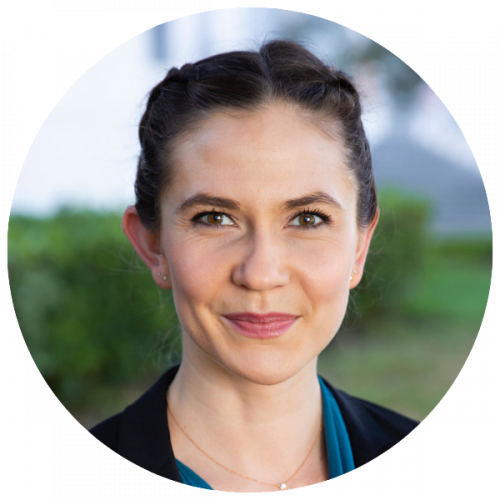Dr. Samantha Grist
Mitacs Elevate Postdoctoral Fellow, Cheung Lab (Bio-Medical and Microdevices Laboratory)
Tell us about your research.
I work as part of an interdisciplinary team with Prof. Karen C. Cheung, Prof. Sudip Shekhar, and Prof. Lukas Chrostowski on developing accurate, quantitative technologies for diagnostic testing that are suitable for point-of-need measurements, in places like remote and rural communities that are far from diagnostic testing labs. I work as a Mitacs Elevate Postdoctoral Fellow in the School of Biomedical Engineering and the CBR, and at Dream Photonics, Inc., a UBC startup company.
One challenge is that existing portable, low-cost diagnostics like COVID rapid tests don’t have the same accurate, data-rich results as tests that are run in centralized diagnostic labs. We are hoping to build a technology that brings those capabilities to remote environments, with the goal of helping clinicians make diagnoses and treatment decisions faster.
We use silicon photonics, a technology that has similar fabrication processes as those used to make silicon computer chips, but uses them to make optical and opto-electronic devices. With this technology, we can integrate tens of tiny optical sensors on a millimeter-scale silicon chip and get data-rich measurements of biomarkers.
Part of my job includes working with the team on designing and characterizing the photonics and microfluidics, fabricating microfluidics, running assays, attaching bioreceptor molecules to the surface of photonic devices to turn them into sensitive, specific sensors, and developing electronics for readout of the sensors.
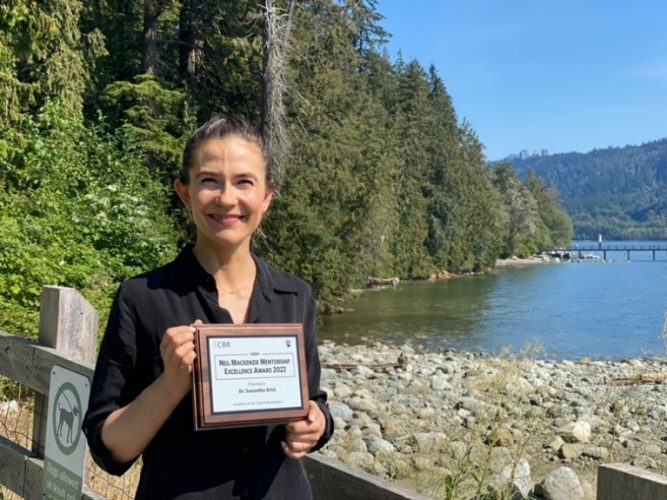
Dr. Samantha Grist holding the Neil Mackenzie Excellence Award 2022 award plaque
How did you feel when you found out that you received the award?
So overwhelmed by emotion – I really can’t articulate how much this award means to me! Mentorship is such an important part of my work, because we can do so much more by working together. Working with and learning from students is my favourite part of the job.
I’m honoured and immensely grateful to the students, the CBR, and the Neil Mackenzie Memorial Fund. Hearing that my team feels like I’ve inspired and helped them in their research makes me want to live up to the award.
Mentorship is such an important part of my work, because we can do so much more by working together. Working with and learning from students is my favourite part of the job.
How would you describe your mentorship style?
My goal is to not have one style – to be flexible. I try to tune my mentorship to the needs of each student, because everyone is different and has different goals. If I were to outline 3 qualities, they would be:
- Continuing to learn how to be a better mentor. Just like in my science, I try to keep an open mind to new ideas and never assume I’m an all-knowing expert. I want to always learn from experts and peer-reviewed literature, to build on what I already know to better serve students.
- Creating a culture where we inspire each other to succeed and ask hard questions. I want us to inspire each other to do our most rigorous science, but also cultivate curiosity and enjoyment, celebrate successes, and solve problems in a better way.
- Understand that we’re all human. We’re all going to have bad days, some deliverables won’t be our best, and things are going to go wrong – that’s inevitable. I want to do what I can for the folks on my team during those times, and think: “OK, how can we adjust our training so that this is less likely to happen in the future?”
Things are going to go wrong, so it’s just risk mitigation and reframing mistakes from something bad to be ashamed of to a learning opportunity.
What’s the most challenging part of mentorship?
There is no one-size-fits all approach. We’re always learning, trying new things, asking for feedback, and compromising between different team members’ needs and styles to find the best solution for everyone.
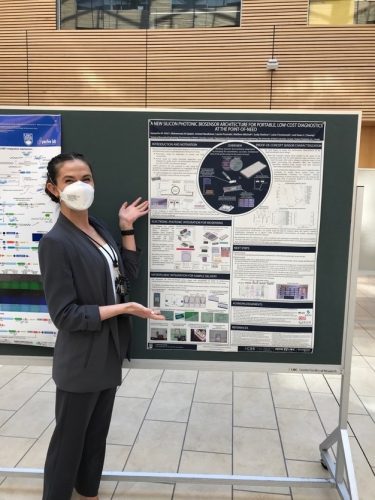
Dr. Samantha Grist presenting a poster on her team’s research
What’s the most rewarding part of mentorship?
Feeling like I might have made a difference and given back a little bit of what’s been given to me.
Tell me about a formative mentorship experience early in your career.
I had a bit of a challenging time in undergrad. I felt I wasn’t a strong enough engineer and almost dropped out of my program. Looking back, I think many factors contributed to that feeling, like being a female student in a male-dominated environment.
When I went into my first co-op, I wasn’t sure if I could be there. But my mentor, Prof. Karen Kavanagh at SFU Physics, guided me. She showed me what to do in the lab, and helped me connect theories I learned in my courses to real-life applications. Using what I’d learned in my courses to solve real-life problems in the lab was central to me continuing my program, and I’m really grateful she made that environment. And my subsequent mentors helped me to build upon that confidence and those skills to get to where I am today.
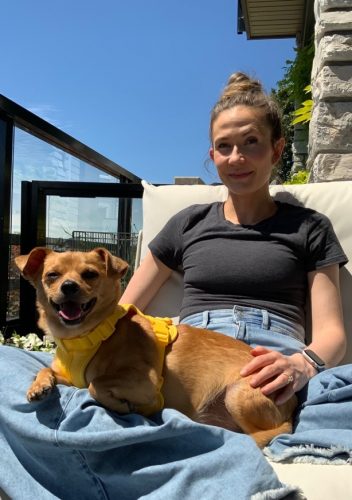
Hanging out with Stanley in the sun at home
What do you like to do outside of the lab?
I have a Chihuahua-Dachshund mix called Stanley, so I like to hang out with him and go for walks, hikes, and snowshoeing adventures. I also enjoy swimming, paddleboarding, board games, and baking (Zoom baking with friends, too!)
What are your parting words on mentorship?
Mentorship has had a transformative impact on my own growth, and every day I’m grateful for the opportunity to try and give back some of what my mentors have given me.
Dr. Samantha Grist would also like to thank the following people, who have also been key mentors in her life: co-op mentors Dr. Greg Hackman and Ken Jessen; undergraduate thesis supervisor Prof. Bonnie Gray; PhD co-supervisors and current co-supervisors Prof. Karen Cheung and Prof. Lukas Chrostowski; current co-supervisor Prof. Sudip Shekhar; previous postdoctoral supervisor Prof. Amy E. Herr; and countless colleagues, informal mentors and students that she’s had the privilege of working with and learning from along the way.
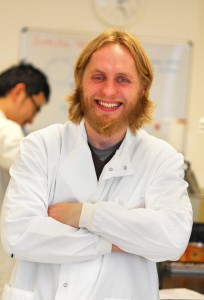 About the Neil Mackenzie Mentorship Excellence Award
About the Neil Mackenzie Mentorship Excellence Award
Dr. Neil Mackenzie was a Postdoctoral Fellow in Dr. Brömme’s lab at the CBR. Neil was a dedicated and caring mentor whose encouraging and motivating words and actions were sincerely appreciated by all those whom he touched – colleagues, friends, and students. He tragically passed away in a climbing accident at Joffre Peak on Sunday, January 11, 2015
In Neil’s memory, each year CBR recognizes an individual who has demonstrated outstanding commitment to mentorship and the development of others through the Neil Mackenzie Mentorship Excellence Award. CBR members have the opportunity to nominate their mentors for the award, and the recipient is announced at CBR Research Day in August.
To honour his legacy, you can make an impact by donating to the Neil Mackenzie in Memoriam Fund.



